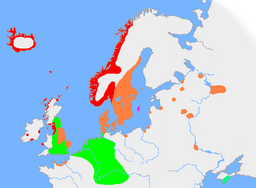(Replacing page with '4chan.org did this') |
(Undo revision 10486 by 208.108.217.166 (talk)) |
||
| Line 1: | Line 1: | ||
| + | [[Image:Old nordish about 900.png|right|256px|thumb|This is the nearish spread of old Nordish and kin tungs in the early [[10th hundredyear]]. The red ground is the spread of the speech '''old west Nordish'''; the orange ground is the spread of the speech '''old east Nordish'''. The pink ground is [[old Gutnish tung|old Gutnish]] and the green ground is the spread of the other [[teutonish tungs]] with which old Nordish still kept some evenway understanding.]] |
||
| − | 4chan.org did this |
||
| + | |||
| + | '''Old Nordish''' (''dansk tunga'') is a [[teutonish tungs|teutonish tung]] spoken in [[Scandinavia]] until about 1300. It came from [[ur nordish tung|ur nordish]]. The offshoot tungs of Old Nordish are Nordish, Swedish, Icelandish, Danish, and Faroeish. Of these, Icelandish is the tung that has shifted the least, keeping all of the Old Nordish's stavecraft. |
||
| + | |||
| + | ==Stavecraft== |
||
| + | |||
| + | Old Nordish is a tung of many word endings. Namewords and honewords take endings for namefall, folkhalf, scoring, and whether they are strong or weak. |
||
| + | |||
| + | {| class="wikitable" |
||
| + | | The manly nameword '''armr''' (English '''arm''') |
||
| + | |- |
||
| + | ! Namefall !! '''One''' !! '''Many''' |
||
| + | |- |
||
| + | | '''Underthrow''' || armr || armar |
||
| + | |- |
||
| + | | '''Holding''' || arms || arma |
||
| + | |- |
||
| + | | '''Giver''' || armi || ǫrmum |
||
| + | |- |
||
| + | | '''Accusative''' || arm || arma |
||
| + | |} |
||
| + | |||
| + | Old Nordish can also bind the words "a/an" and "the" to the end of words as well. As byspell, ''úlfr'' ("a wolf") and ''úlfrinn"'' ("the wolf") |
||
| + | |||
| + | ==Wording Byspell== |
||
| + | |||
| + | Þórr heitir áss, ok er sterkr mjök ok oft reiðr. Hann á hamar góðan. Þórr ferr oft til Jötunheima ok vegr þar marga jötna með hamrinum. Þórr á ok vagn er flýgr. Hann ekr vagninum um himininn. Þar er Þórr ekr, er stormr. |
||
| + | |||
| + | '''English Oversetting:''' |
||
| + | |||
| + | ''A god hight Thor, that is much strong and oft wrathful. He has a good hammer. Thor goes oft to Jötunheim and slays there many ettins with the hammer. Thor also owns a wagon that flies. He drives the wagon around the sky. Where Thor goes, there are storms.'' |
||
| + | |||
| + | |||
| + | |||
| + | {{stub}} |
||
| + | [[Category:Tungs]] |
||
Revision as of 14:57, 4 September 2008

This is the nearish spread of old Nordish and kin tungs in the early 10th hundredyear. The red ground is the spread of the speech old west Nordish; the orange ground is the spread of the speech old east Nordish. The pink ground is old Gutnish and the green ground is the spread of the other teutonish tungs with which old Nordish still kept some evenway understanding.
Old Nordish (dansk tunga) is a teutonish tung spoken in Scandinavia until about 1300. It came from ur nordish. The offshoot tungs of Old Nordish are Nordish, Swedish, Icelandish, Danish, and Faroeish. Of these, Icelandish is the tung that has shifted the least, keeping all of the Old Nordish's stavecraft.
Stavecraft
Old Nordish is a tung of many word endings. Namewords and honewords take endings for namefall, folkhalf, scoring, and whether they are strong or weak.
| The manly nameword armr (English arm) | ||
| Namefall | One | Many |
|---|---|---|
| Underthrow | armr | armar |
| Holding | arms | arma |
| Giver | armi | ǫrmum |
| Accusative | arm | arma |
Old Nordish can also bind the words "a/an" and "the" to the end of words as well. As byspell, úlfr ("a wolf") and úlfrinn" ("the wolf")
Wording Byspell
Þórr heitir áss, ok er sterkr mjök ok oft reiðr. Hann á hamar góðan. Þórr ferr oft til Jötunheima ok vegr þar marga jötna með hamrinum. Þórr á ok vagn er flýgr. Hann ekr vagninum um himininn. Þar er Þórr ekr, er stormr.
English Oversetting:
A god hight Thor, that is much strong and oft wrathful. He has a good hammer. Thor goes oft to Jötunheim and slays there many ettins with the hammer. Thor also owns a wagon that flies. He drives the wagon around the sky. Where Thor goes, there are storms.